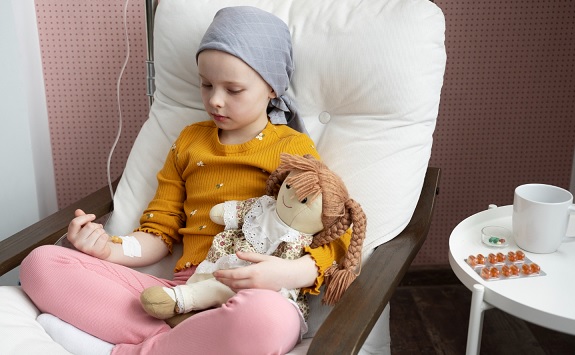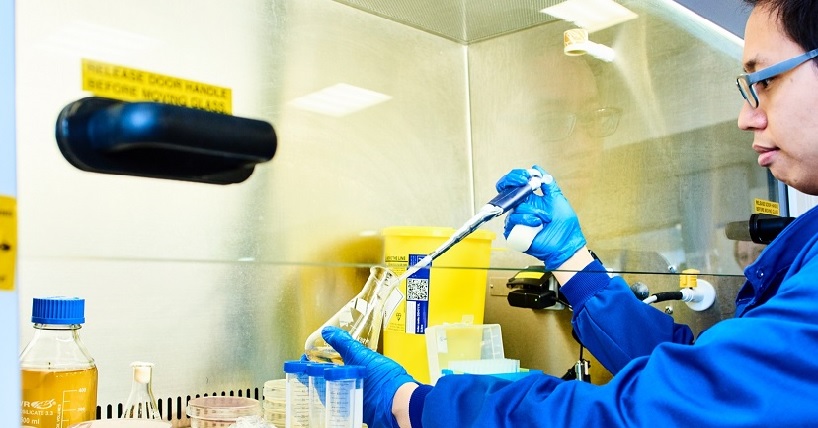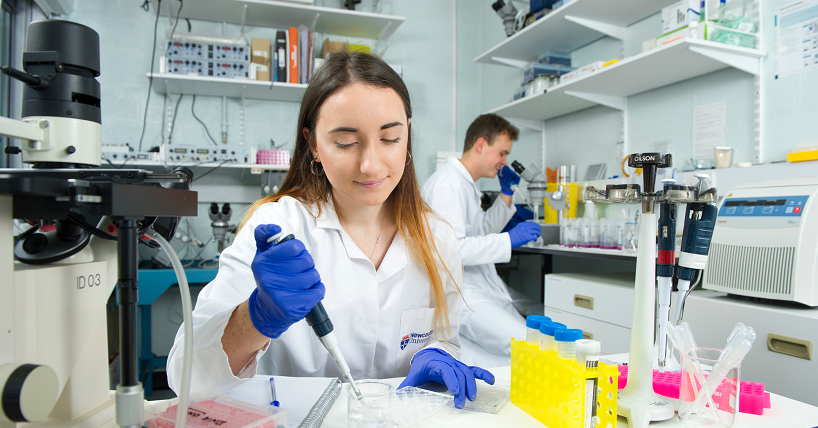The Newcastle Centre for Cancer Leukaemia Group comprises 10 principal investigators focusing on acute lymphoblastic leukaemia (ALL) , acute myeloid leukaemia (AML) and chronic lymphocytic leukaemia (CLL).
Our research profile spans fundamental biology and genomics through to phase III clinical trials.
We have extensive expertise in genetics/genomics, epidemiology, bioinformatics and preclinical drug development.

Current and future research themes
- Exploiting state-of-the-art genomic technologies to deepen our understanding of the drivers of disease initiation and progression
- Identifying novel therapeutic approaches especially for relapsed and refractory disease
- Harnessing big data and artificial intelligence to improve our ability to predict treatment response
The Leukaemia Research Group at Newcastle University comprises 9 research teams with overlapping interests and expertise enabling us to undertake internationally competitive research into the biology and treatment of acute lymphoblastic leukaemia, acute myeloid leukaemia and chronic lymphocytic leukaemia.
Exploiting state-of-the-art genomic technologies to deepen our understanding of the drivers of disease initiation and progression
We believe that a thorough understanding of the genetics of individuals who develop leukaemia as well as the leukaemic cells which drive the disease is crucial to discovering the causes of leukaemia as well as identifying optimal treatment strategies. Collectively we have expertise in a wide range of methods ranging from cytogenetics to whole genome sequencing and single-cell transcriptomic profiling. We have systemically applied these techniques to primary patient samples to build rich datasets which have generated unique biological insights.
Example:
- As IG::MYC translocations are characteristic of B-cell lymphoma, rare leukaemias presenting with this genetic hallmark present a diagnostic and management challenge. By developing a large international cohort of these cases, Lisa Russell and Simon Bomken were able to molecularly characterise this disease, confirming it as a true acute leukaemia. Furthermore, they showed that it carries a poor prognosis. As a result of their study, children with this rare leukaemia are now eligible to be recruited to the ongoing international clinical trial, ALLTogether1.
Identifying novel therapeutic approaches especially for relapsed and refractory disease
The treatment of leukaemia, particularly acute leukaemia, requires the use of multiple drugs delivered over months or years. Until recently, most of the drugs have been traditional chemotherapeutic agents with high levels of toxicity. More recently several targeted drugs and immunotherapeutic approaches have improved outcome and reduce side-effects. However, some patients do not respond to any of the current arsenal of drugs and a significant proportion of patients will relapse. Therefore, developing new drugs and re-purposing existing drugs is crucial to improving cure rates. We have extensive experience in pre-clinical modelling as well as drug profiling and development. Building on our knowledge of the genetics of leukaemia, we have pioneered the use of targeted drugs in early and late phase clinical trials.
Example
- Patients with an ABL-class fusion (rearrangements involving ABL1, ABL2, PDGFRB or CSF1R) have a slow treatment response and high-risk of relapse when treated with standard chemotherapy. The biological similarity between ABL-class fusions and the canonical BCR::ABL1 fusion gene indicated that these patients would be sensitive to therapy with tyrosine kinase inhibitors. In the UKALL2011 trial, we screened patients who had high levels of disease at the end of induction for ABL-class fusions and added a tyrosine kinase inhibitor to their standard chemotherapy regimen. This intervention led to a reduced risk of relapse for these patients. As a result of this research all patients treated on the ALLTogether01 trial will be tested at diagnosis for ABL-class fusions and have a tyrosine kinase inhibitor added to their therapy regimen.
Harnessing big data and artificial intelligence to improve our ability to predict treatment response
Over the past few decades, the treatment of many types of leukaemia, particularly, childhood leukaemia, has advanced significantly. Predicting the response of patients to standard, targeted and novel therapies is vital to ensure that patients receive the optimal type and intensity of treatment. We have leveraged strong links with national and international clinical trial groups to assemble patient datasets which are annotated with comprehensive clinical, treatment, genetic and outcome data. By applying traditional statistical and machine learning methods, we have discovered numerous clinically relevant biomarkers and profiles. Moreover, several have been adopted into clinical practice and are used to assign patients to the most appropriate therapeutic pathway balancing the need to cure a patient whilst reducing long-term toxicity.
Example.
- Using genetic engineering to determine the impact of gene mutations on disease risk and response to treatment. By using sophisticated genetic engineering tools developed over the last 15 years, we can now routinely generate cell models with alterations that are observed in human cancer, allowing us to determine how those alterations affect disease risk and response to treatment. These state-of-the-art genetic techniques allow us to identify individuals at high risk of developing disease or those who are likely to benefit from alternative treatment approaches to reduce the risk of disease relapse or toxicity.


.jpg)
.jpg)

.jpg)
